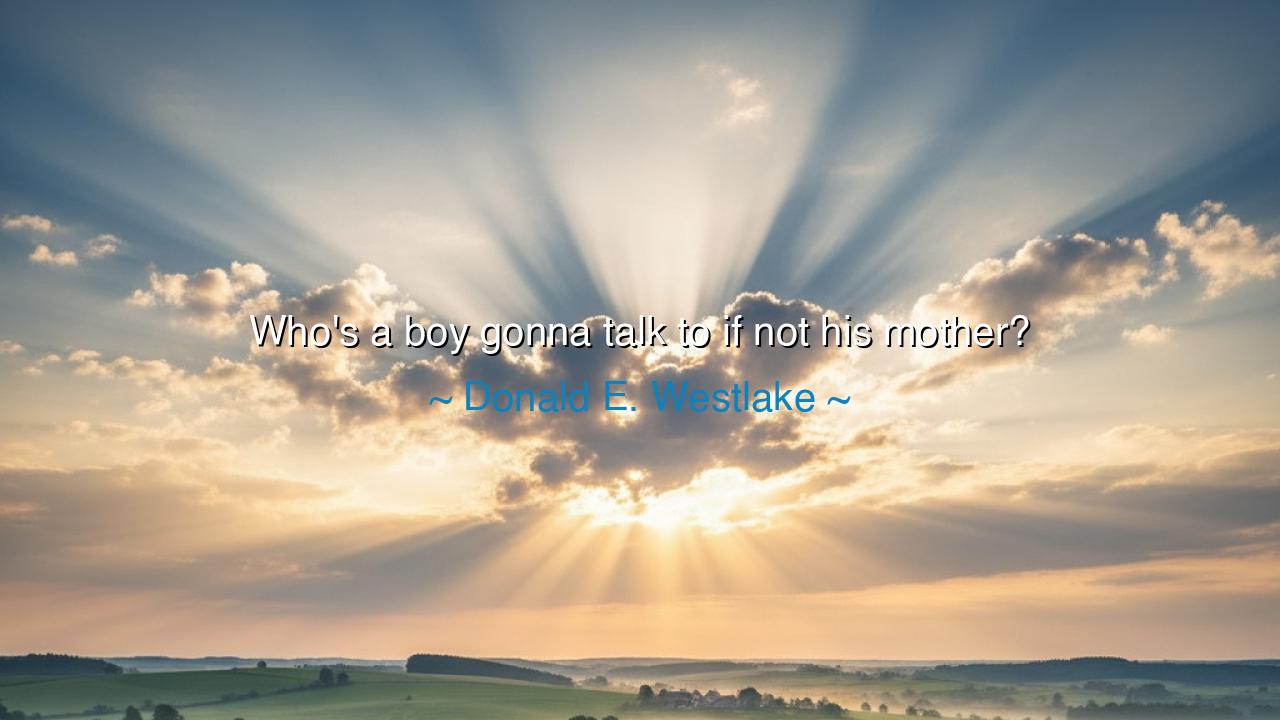
Who's a boy gonna talk to if not his mother?






Hear the words of Donald E. Westlake, who with simple speech revealed a profound truth: “Who’s a boy gonna talk to if not his mother?” In this saying lies the acknowledgment of the eternal bond between child and parent, the tie that stretches beyond time and circumstance. For in the beginning, before teachers, before companions, before the world itself takes hold of the heart, there is the mother—the first ear to listen, the first heart to understand, the first refuge for a troubled soul.
The ancients knew that counsel is the anchor of the spirit. Kings had their advisers, warriors had their comrades, philosophers had their students. Yet before all of these, the boy has his mother. Her wisdom may not be written in books, nor her speech clothed in the language of scholars, but her voice carries the weight of love and truth, which are greater than parchment or crown. When the world confuses, when the path is dark, a child turns instinctively to the one whose arms once carried him, whose voice first called him by name.
Consider the tale of Alexander of Macedon. Before he became known as Alexander the Great, he was but a youth, guided and often rebuked by his mother, Olympias. Fierce though she was, her presence shaped his destiny. In letters and counsel, she reminded him of his blood, his purpose, and the greatness she believed was in him. Who did the boy Alexander speak to before he conquered empires? His mother—for even a future world-conqueror first learns to speak his fears, his doubts, and his ambitions in the sanctuary of maternal counsel.
So too in sacred texts we read of Samuel, who as a child was dedicated to the temple, yet returned often to the influence of his mother, Hannah. Her prayers and promises shaped his life, and the echo of her devotion gave him strength to listen to the voice of God when others could not. Thus again we see: the boy speaks to his mother, and through her, he learns to listen to the deeper truths of life.
The meaning of Westlake’s words is not only tender but also cautionary. For if the boy has no mother to speak to—whether by loss, by neglect, or by silence—he must carry his burdens alone, and the weight may bend his spirit. A world without listening mothers is a world with wandering sons, uncertain of where to place their trust. Thus, the bond between mother and child is not only personal but societal, a thread that strengthens the very fabric of humanity.
The lesson for us is this: cherish the listening ear, honor the bond of openness. To the mother, be that refuge—listen with patience, counsel with love, guide without crushing. To the son, do not despise the wisdom of your mother, for her counsel is not born of selfishness but of sacrifice, of nights without rest and days without ease, all for your sake. And to those who may not have a mother present, seek the spirit of such counsel in those who love you deeply, for the role of a listening heart can be carried by others, though never in quite the same way.
Practical action flows naturally from this teaching: create spaces of honesty within your families. Let the boy speak without fear of scorn, and let the mother listen without haste. Let your words to one another be seasoned with truth and tenderness. And above all, remember that the greatest wisdom often comes not from the lips of the mighty, but from the quiet voice of one who has loved you since your first breath.
Thus let Westlake’s words be remembered: “Who’s a boy gonna talk to if not his mother?” They are a reminder that the world may offer many teachers, but only one heart carries the depth of a mother’s listening. Treasure it, honor it, and in honoring it, you honor the very source of life itself.






AAdministratorAdministrator
Welcome, honored guests. Please leave a comment, we will respond soon